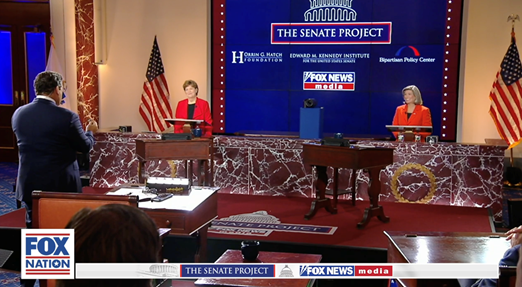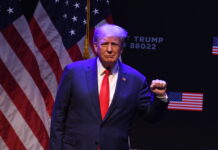Senator Joni Ernst (R-Iowa) and Senator Jeanne Shaheen (D-N.H.), members of the Senate Armed Services Committee, participated in a bipartisan debate on foreign policy hosted by the Edward M. Kennedy Institute, Bipartisan Policy Center, and Orrin G. Hatch Foundation.
Highlights from the debate include:
“In my view, our nation’s security and prosperity have declined and done so quickly under the current administration. Their choices demonstrate a mix of appeasement in the name of international consensus, and an inability to assume risk to protect the homeland. Without a change in vision, chaos will continue to reign.”
“Friends, I don’t want America to be the world’s policeman. And I’m not advocating for global democracy building and a return to former versions of Republican foreign policy. I believe in American leadership. I believe in America first, always, but never America alone. Forging strong partnerships and allied networks around the world are essential to America’s security and prosperity here at home.”
“The United States is not here simply for the good of the world, but to lead and help create stability in order to protect our people, our freedoms, and our way of life.”
On bipartisanship:
“While we’ve had some differences, whether it’s over the JCPOA, which President Biden was negotiating with Iran, maybe differences of thought on Afghanistan, certainly there is a lot of commonality.”
“And we do come together to make sure that the men and women that are wearing our uniform, the uniform of our nation, that we provide them with what they need, their training, their weapons platforms, making sure that they have survivability.”
On countering the threat of Russia:
“Russia is one of the top four adversaries of the United States. The Ukrainians are doing an incredible job of pushing back our adversary.”
“I think we need to provide the military platforms as necessary for them to win. And I am critical of this administration, because I don’t feel that they have done enough soon enough.”
“Our NATO partners, friends in Europe, they can step up and provide humanitarian support for the Ukrainians. This is where we can provide some savings.”
On the Biden administration’s weak approach to China:
“We have to figure this out for the long term, how we can decouple what we can and what would be in our national security interests from China. I don’t think this administration has been aggressive enough, when it comes to China policy. The National Security Strategy named China only nine times it named climate (…) 63 times. You can see where the focus is.”
On combatting the national security risk of fentanyl:
“Senator Tim Kaine and I are currently working on a piece of legislation that would push back against fentanyl, and it would allow greater collaboration between our [U.S. and Mexican] militaries to push back on fentanyl.”
On the reality of the increasing threat of Iran:
“Iran is an adversary, and I do not see in the near future where our two countries will come together. Iran has stated for a decade plus that their intent is to destroy Israel and destroy the United States of America.”
“What Iran is doing right now is digging underground bunker structures in order to complete that process. And pretty soon that will be completed. And we would have very little opportunity to disrupt by force their development of a nuclear bomb.”
“They are killing women in the streets, protesters disappear, never to be seen again. This is not a type of governmental institution that we can deal with just by conversing. This administration has been very lacking when it comes to leadership pushing back against Iran.”
“We have an administration that refuses to step up and enforce their own sanctions.”
On growing the United States’ relationship with Saudi Arabia:
“We need to continue working with Saudi Arabia for the stability of that region. They are a very powerful player.”
“The Abraham Accords that came out of the last administration were incredibly important to bring a number of Arab nations together with Israel and normalize those relations.”
“We want to see Saudi Arabia normalize their relations with Israel.”
Ernst concluded by saying:
“We as Americans have a choice. We can complain about the direction America is headed. Or we can step up and inspire the next generation of leaders and freedom-loving fighters. Now is not the time for America to shrink back.”
“I think you’ve heard that from the discussion today. It’s not the time to abandon our allies and it’s not the time to be promoting progressive fantasies at the expense of security and prosperity for our nation. Now is the time for an unwavering commitment to restoring our federal government to its founding and limiting role of protection.”

















